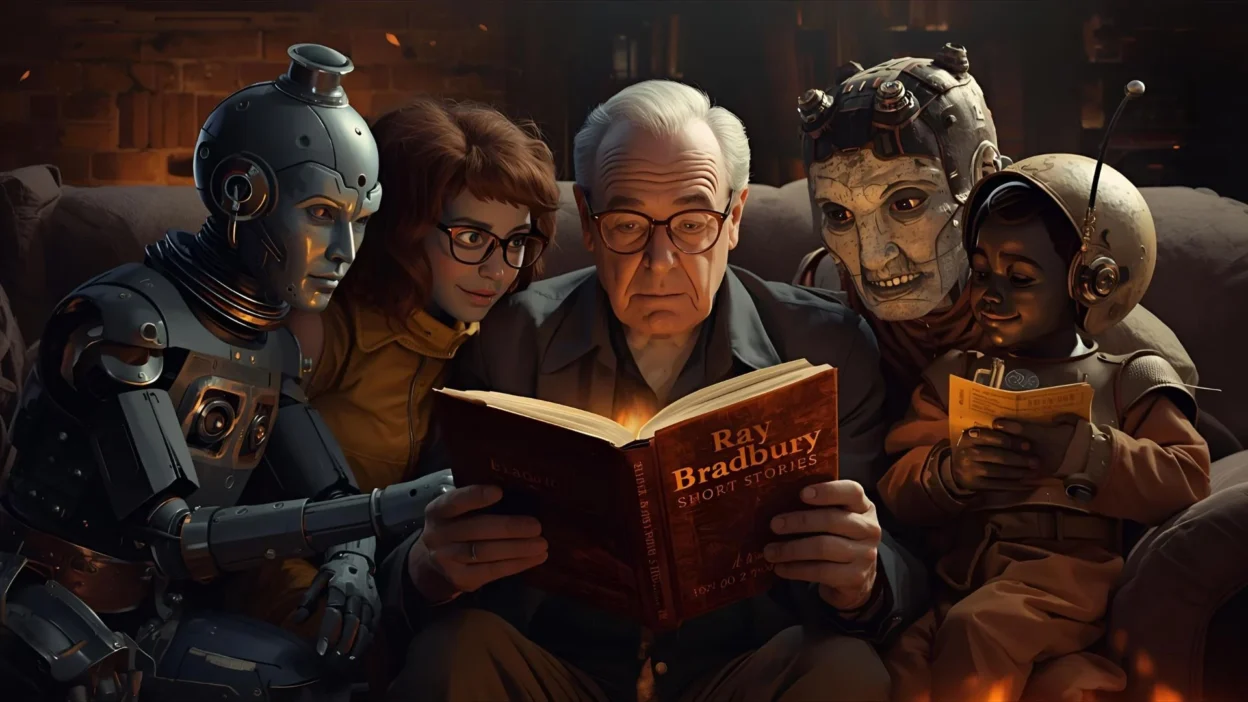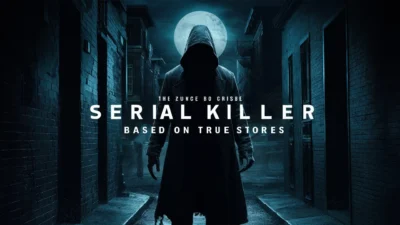Ray Bradbury short stories have remained timeless, captivating readers with their mix of imagination, heart, and profound morals. For adults who love exploring powerful themes through science fiction, fantasy, and human emotion, this list of Ray Bradbury short stories brings you the top, hot, and trending reads of 2025.
We’ve carefully selected the best Ray Bradbury short stories while also crafting fresh, original tales inspired by his timeless style. Whether you’re a lifelong fan or someone searching for new short fiction, this collection blends creativity, morals, and meaning in every story.
Story 1: The Last Signal
The desert town was silent except for an old radio in Mr. Harlan’s garage. It hadn’t worked in years, but one evening, as the sun dipped low, static cracked through the speakers. Then came a faint voice—soft, trembling, and impossible.
“Is anyone alive out there?”
Harlan froze. The message repeated. He grabbed a notebook and wrote down every word. Soon, the townsfolk gathered around his garage each night, listening to the eerie broadcast. The voice spoke of lost cities, vanished oceans, and skies without stars. Some dismissed it as a prank. Others whispered it was the Earth’s future calling back in time.
Harlan refused to ignore it. He believed the voice was a warning meant for them. When he begged the townsfolk to change—to conserve, to protect, to care—they laughed. But Harlan stayed by the radio, listening.
One night, the voice went silent. And the stars above flickered, dimmer than before.
Moral: Warnings unheeded today may become regrets tomorrow.
Story 2: The Mechanical Garden
In the center of the city stood a breathtaking park, its trees humming softly, leaves glowing in faint neon colors. Children played beneath robotic willows, and mechanical bees buzzed through artificial blossoms. To the people, it was perfection—nature reborn through technology.
But Lydia, a schoolteacher, felt uneasy. When she touched a leaf, it pulsed warmly, like a heartbeat. She started noticing odd things: no insects except the buzzing machines, no birds except metal replicas.
One day, a boy ran into class with a crumbled flower. Its glowing petals leaked oil. The city ignored Lydia’s concerns, praising progress. But she remembered her grandmother’s orchard, once alive with real apples, real soil, real sun.
At night, she wandered the mechanical garden. The trees whispered in artificial voices, asking her to stay. Lydia shivered. She fled, vowing never to return. But deep down, she feared it was already too late for the world outside those gates.
Moral: Technology cannot replace the living soul of nature.
Story 3: Shadows on the Moon
Colonists on the Moon built shining domes, their pride glowing like lanterns in the endless dark. But behind the walls, shadows moved where no light should fall.
Captain Reeves first noticed it. A shadow flickered across his room though no one stood nearby. Soon, children cried of “dark men” that whispered their names. The engineers dismissed it as stress. Reeves wasn’t so sure.
Late one night, he followed the shadows. They stretched along the walls like liquid, leading him to the edge of the dome. Beyond the glass, the Earth hung pale and far away. The shadows pressed against the dome, eager, hungry.
Reeves realized what they were: memories of all humanity had lost—the forests, oceans, and skies they abandoned. The shadows weren’t monsters. They were grief itself. But grief, if ignored, could consume.
Reeves whispered, “Forgive us.” The shadows paused… but they did not leave.
Moral: We cannot escape the weight of what we destroy.
Story 4: The Clockmaker’s Children
Old Mr. Durant was a clockmaker who never married, never had children. Instead, he built wooden dolls with glass eyes and winding keys in their backs. To him, they were his family.
At night, he would line them up around the dinner table, speaking to them as if they were alive. Sometimes, he imagined they spoke back. The townsfolk pitied him but tolerated his strange ways.
One autumn evening, a traveling merchant visited his shop. Curious, he wound up one of the dolls. To his horror, the doll blinked and whispered, “Father?” The others turned their heads, their eyes shining faintly.
The merchant fled, but Durant only smiled. His children had finally awakened. For weeks, neighbors heard laughter echoing from the shop long after midnight. Then one morning, the shop was empty. Durant and his “children” were gone, leaving only ticking sounds in the wind.
Moral: Loneliness can build worlds too real to escape.
Story 5: The Burning Library
The city was proud of its great digital library, storing millions of books in glowing archives. Children never touched paper; they tapped screens instead.
But Mira, a quiet girl, discovered something strange. In the basement of the library was a locked room filled with dusty books—real books, with covers and pages that smelled of age. She opened one and felt her heart race. The words were alive in a way the screens never managed.
That night, she dreamed of flames. When she awoke, alarms blared—the digital servers were burning, sparks tearing through the circuits. The city panicked, screaming that knowledge would vanish. But Mira smiled sadly. She returned to the basement, clutching the paper books.
While the screens turned to ash, the stories survived in her arms.
Moral: True knowledge survives when it is cherished, not just stored.
Story 6: The Silent Carnival
Once a year, the traveling carnival arrived in the valley. But this one was different—it had no music, no barkers, no clowns. Just silence.
Children wandered through rides that moved without sound: Ferris wheels spinning, merry-go-round horses galloping, all in ghostly quiet. The townsfolk whispered uneasily, but curiosity pulled them in.
Samuel, a farmer, noticed something odd. When a person stepped off a ride, they looked paler, thinner, as though the carnival had stolen something from them. His wife begged him to stay away, but Samuel boarded the Ferris wheel.
As it climbed, he saw not the valley but endless stars, a galaxy stretching far and wide. He felt his memories tugged away—his childhood, his first kiss, the face of his mother. He screamed, but no sound came.
When he stepped off, he was smiling emptily, like the others.
Moral: Not every wonder is meant to be embraced.
Story 7: The Man Who Collected Rainbows
In a dry and gray city where the sky never cleared, Jonas carried jars filled with color. He claimed they were rainbows he had captured on rare bright days.
Children loved him, begging to see the swirling hues trapped in glass. But the city officials scoffed, saying Jonas was a fraud, selling illusions of hope. They tried to seize his jars, but Jonas fled.
One night, a storm finally rolled across the city. Thunder shook the rooftops, and lightning split the sky. Jonas ran to the town square, holding up his jars. When the rain came, he smashed them open.
Colors burst forth, painting the storm with arcs of fire and light. For the first time in decades, the city saw a rainbow. By morning, Jonas was gone, but the sky never seemed as gray again.
Moral: Hope, once shared, cannot be taken away.
Story 8: The Room of Echoes
Deep in an abandoned theater, Henry found a locked door. On it was written: Do not enter, lest you wish to hear yourself forever.
Curiosity won. Inside, he discovered a room that whispered. At first, it repeated his words, but soon, it spoke his thoughts before he could.
Then it spoke things he had never said—his regrets, his lies, his secret cruelties. The more he listened, the more the room revealed. He begged it to stop, but the echoes laughed with his own voice.
When his friends found him days later, Henry sat silent, his lips unmoving. Yet the room behind him still whispered with his voice, echoing endlessly.
Moral: The past we hide will always find a voice.
Story 9: The Lanterns of Time
Every century, the mountain village lit golden lanterns that floated into the sky. Tradition claimed they carried wishes to the future.
Young Clara loved the ritual, but one night, a lantern drifted back down. Inside was a note written in her own handwriting, dated fifty years ahead. It begged her: Do not trust the one who promises eternal light.
Years later, a traveling inventor arrived, selling machines that lit streets forever without fire or oil. The villagers cheered, but Clara remembered the warning. She refused the invention, while the rest embraced it.
Soon, the machines hummed with strange energy, and the village nights turned sleepless, haunted by a glow that never dimmed. Clara, clutching her lantern, was the only one who dreamed in darkness.
Moral: Not every promise of progress brings peace.
Story 10: The Last Storyteller
When machines began writing books faster than humans, people stopped telling stories by heart. Villages grew quiet, and imagination withered.
Except for old Mrs. Alden. Each night, she gathered children by firelight and spun tales—dragons, ghosts, heroes, and love. Some mocked her, saying no one needed stories anymore when machines could print a thousand in an hour.
But one night, the machines failed. Pages went blank, screens went dark. The world grew hungry for words. Then they remembered Mrs. Alden. She smiled, her voice strong, weaving stories into the silence.
Her words lit hearts brighter than any machine ever could.
Moral: The human voice will always be the soul of storytelling.
Conclusion
This collection of Ray Bradbury short stories–inspired tales shows why his work remains among the best Ray Bradbury short stories even in 2025. His influence reminds us that imagination, humanity, and morality matter more than ever.
Whether you’re searching for a list of Ray Bradbury short stories, or exploring trending fiction that echoes his brilliance, these modern stories prove that Bradbury’s spirit lives on. For adult readers seeking the hot, top, and timeless in short fiction, this collection keeps his legacy alive.

I am Beatrix Potter, a storyteller who loves bringing the wonders of nature, imagination, and gentle magic to life. Through my stories, I share worlds filled with curious animals, quiet countryside adventures, and the kind of simple beauty that warms the heart. Here on magicstoris.com, I continue to inspire readers of all ages with tales that celebrate kindness, creativity, and the timeless joy of storytelling.




